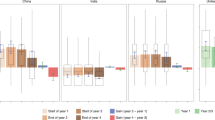Abstract
THE discussion at the British Medical Association on July 1 on the place of preliminary science in the medical curriculum seemed to indicate practical unanimity on some points, such as the need for a higher minimum standard of general education, the raising of the minimum age for the registration of medical students to seventeen years, and the necessity for the maintenance of a high standard of instruction in physics, chemistry, and biology. There was no indication of the desire on the part of any one of the speakers to reduce the present standard of requirements in any one of these three fundamental sciences, and several suggestions were put forward for extending the courses of each of them into the later years of medical study.
This is a preview of subscription content, access via your institution
Access options
Subscribe to this journal
Receive 51 print issues and online access
$199.00 per year
only $3.90 per issue
Buy this article
- Purchase on Springer Link
- Instant access to full article PDF
Prices may be subject to local taxes which are calculated during checkout
Similar content being viewed by others
Author information
Authors and Affiliations
Rights and permissions
About this article
Cite this article
HICKSON, S. Science in Medical Education. Nature 105, 643–644 (1920). https://doi.org/10.1038/105643a0
Issue Date:
DOI: https://doi.org/10.1038/105643a0
Comments
By submitting a comment you agree to abide by our Terms and Community Guidelines. If you find something abusive or that does not comply with our terms or guidelines please flag it as inappropriate.



